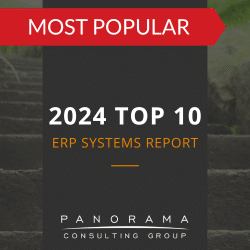Making the transition from disparate, legacy systems onto a centralized enterprise resource planning (ERP) system is a major change. While the benefits of ERP software are vast, it’s important to ensure your business is ready to embrace it.
Today, we’re sharing a few key ways you can ensure business readiness before moving forward. This way, you’ll be poised for success from the very beginning.
The Difficulty of Organizational Change
It’s easy to understand the underlying urgency that precedes most organizational change. The need for change is often driven by an inherent weakness or gap that must be addressed.
However, in both the personal and professional realm, change is rarely easy. This is especially true when you’re undertaking an enterprise-wide project that will require major adjustments to the way your workforce operates. This is where change management comes in. What is change management? This refers to the actions required to manage the “people side” of change. It’s about helping your workforce embrace new technology and business processes.
That said, it’s important to approach change strategically. Preparation can help ensure that your business is ready to embrace change.
The 2024 Top 10 ERP Systems Report
What vendors are considering for your ERP implementation? This list is a helpful starting point.
What is Business Readiness?
Business readiness is one aspect of overall ERP readiness. It refers to the degree to which your employees and other stakeholders are prepared for organizational change.
Before you begin an ERP project or even select an ERP vendor, it’s critical to perform a business readiness assessment. This is essentially an analysis that can help you determine if your business is ready to accept change.
A few of the important questions to ask include:
- What is the scope of change?
- What impact will process changes have on individual employee roles?
- Do we have the support and buy-in of our executive team?
- Is our culture accepting of change?
- What organizational attributes will make change challenging?
- Do we have a change management plan?
- Is our change management plan integrated with our project plan?
Benefits of Conducting a Business Readiness Assessment
Why should you go to the trouble of conducting a business readiness assessment before undergoing an ERP implementation? When you do, you can better understand the following:
- Level of alignment between leadership, project management and change management
- Level of change resistance
- Root causes of change resistance
- Effectiveness of leadership’s communication efforts regarding the project thus far
- Clarity of project objectives and enterprise strategy
- Clarity of project team roles and responsibilities
- Quality and completeness of the organizational change management plan
A business readiness assessment is one of the ERP implementation best practices that we recommend to clients. Taking the time to conduct this assessment can help you uncover team member frustrations, organizational challenges and other key issues before you take the next step.
Most importantly, it emphasizes the importance of change management, which can be useful if you’re trying to include it in your ERP budget.

How to Ensure Business Readiness Before an ERP Project
1. Create an Organizational Change Management Strategy
Ultimately, your newly integrated system should lead to ERP business benefits, but only if there are strategic steps in place to ensure user adoption.
Developing an organizational change management strategy can help you achieve the ROI you expect. It helps you manage and minimize employee resistance and build overall change competency.
2. Ensure Executive Support
Put simply, an ERP project cannot survive without the support and buy-in of your C-suite. Executives and key stakeholders in your company should be visibly supportive of the project’s vision, strategy, costs and risks. In addition, they should also be involved in key decisions and informed about what resources you will require along the way.
ERP implementation companies, like Panorama can help you develop a business case that convinces executives to not only invest in ERP but be actively involved throughout the project.
3. Communicate Clearly and Often
This isn’t a project to keep under wraps until your go-live date. Every step of the way, it’s important to communicate with employees.
A good place to start is by answering the fundamental question, “What is ERP software?” While this may seem obvious, you’d be surprised how many companies assume employees don’t care about these kind of details.
Employees also want to know about new job responsibilities and changes to their roles within the organization, so you should be prepared to communicate the change impacts of new systems.
Additionally, it’s important to communicate the impacts of new business processes as many organizations undergo business process reengineering as part of their ERP project.
As you consider the best way to craft your communication strategy, keep your organizational culture in mind. In other words, consider the values that guide the behavior and emotions of your workforce when determining how to convey important information.
4. Provide Customized End-user Training
In addition to simply being hesitant, your workforce might completely resist new software because it appears too complicated or confusing. This is where customized end-user training comes in.
It’s essential to work with your software consultant to provide each individual employee with the specific training they need to understand the new system. Doing so helps them feel empowered, not intimidated, by the new technology and processes.
Helping Your Organization Embrace Change
Implementing an ERP system means making an important investment in the future of your organization. However, if your company isn’t prepared for change, you could end up with robust tools and resources that your company isn’t able to support.
A business readiness assessment can help you understand if your company is positioned to accept organizational changes. If the answer is no, then the steps above can help you prepare your organization.
Our organizational change management consultants can help you assess your company’s appetite for change and ability to transition to new ways of working. To speak with an expert, request a free consultation below.














